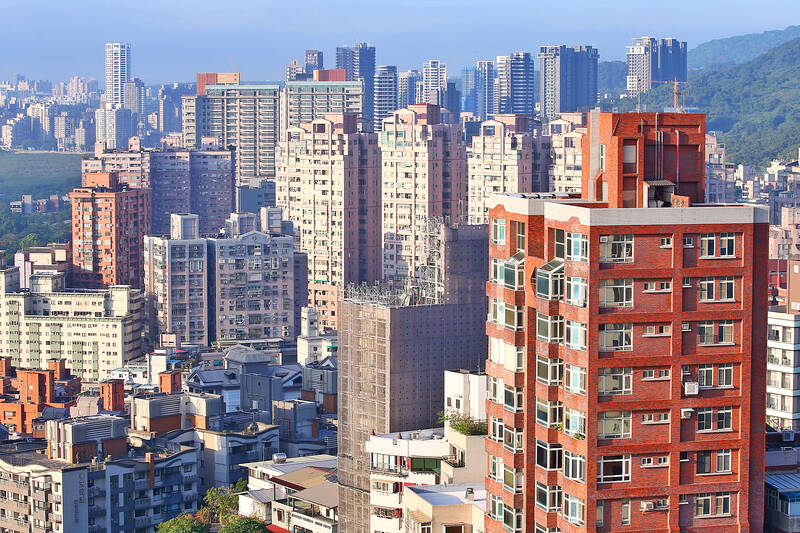Presale projects and new houses last year totaled NT$1.1 trillion (US$34.84 billion) in northern Taiwan, suggesting a 12.1 percent fall to a four-year low, as unfavorable policy measures and economic uncertainty prompted developers to stay conservative, Chinese-language My Housing Monthly (住展雜誌) said yesterday.
Taipei and Yilan County bucked the trend with annual increases of 8.7 percent and 36 percent to NT$290.18 billion and NT$27.97 billion respectively, while Keelung posted the steepest decline of 52.9 percent, the magazine said.
Presale projects and new houses slumped 27.2 percent to NT$244.67 billion in Taoyuan, dropped 15.3 percent to NT$372.77 billion in New Taipei City and decreased 8.4 percent to NT$157.26 billion in Hsinchu city and county, it said.

Photo: CNA
Developers adopted a conservative business approach last year to cope with unfavorable policy measures including interest rate hikes, a ban on transfers of presale project purchase contracts, credit controls and other restrictive terms, My Housing Monthly spokesman Chen Ping-chen (陳炳辰) said.
Other negative factors also included a global economic slowdown that weighed on Taiwan’s exports and political uncertainty linked to the recently concluded presidential election, Chen said.
Taipei managed a modest growth despite rising house prices caused by high-profile projects in Daan (大安), Songshan (松山) and Zhongshan (中山) districts, Chen said.
House prices in the capital have proved resilient in bad times, giving companies the confidence to go ahead with product launches, he said, adding that the pace of correction is limited in New Taipei City, as people grow increasingly interested in living in New Taipei City and Taipei.
Taoyuan fared badly as developers focused their attention on New Taipei City and Taipei, Chen said.
Yilan reported a fast advance due to the introduction of major apartment complexes in Suao (蘇澳) and Wujie (五結) townships, while a high comparison base in 2022 contributed to Keelung’s poor showing last year, he said.
The market might sail smoothly this year, as the presidential election is over and the incoming administration would be business-friendly, Chen said.
The central bank has since June last year held interest rates unchanged and is unlikely to turn hawkish moving forward, he said.
Developers who previously stayed on the sidelines might be more active this year, encouraged by continued interest subsidies for first-home purchases, Chen said.

‘SWASTICAR’: Tesla CEO Elon Musk’s close association with Donald Trump has prompted opponents to brand him a ‘Nazi’ and resulted in a dramatic drop in sales Demonstrators descended on Tesla Inc dealerships across the US, and in Europe and Canada on Saturday to protest company chief Elon Musk, who has amassed extraordinary power as a top adviser to US President Donald Trump. Waving signs with messages such as “Musk is stealing our money” and “Reclaim our country,” the protests largely took place peacefully following fiery episodes of vandalism on Tesla vehicles, dealerships and other facilities in recent weeks that US officials have denounced as terrorism. Hundreds rallied on Saturday outside the Tesla dealership in Manhattan. Some blasted Musk, the world’s richest man, while others demanded the shuttering of his

TIGHT-LIPPED: UMC said it had no merger plans at the moment, after Nikkei Asia reported that the firm and GlobalFoundries were considering restarting merger talks United Microelectronics Corp (UMC, 聯電), the world’s No. 4 contract chipmaker, yesterday launched a new US$5 billion 12-inch chip factory in Singapore as part of its latest effort to diversify its manufacturing footprint amid growing geopolitical risks. The new factory, adjacent to UMC’s existing Singapore fab in the Pasir Res Wafer Fab Park, is scheduled to enter volume production next year, utilizing mature 22-nanometer and 28-nanometer process technologies, UMC said in a statement. The company plans to invest US$5 billion during the first phase of the new fab, which would have an installed capacity of 30,000 12-inch wafers per month, it said. The

MULTIFACETED: A task force has analyzed possible scenarios and created responses to assist domestic industries in dealing with US tariffs, the economics minister said The Executive Yuan is tomorrow to announce countermeasures to US President Donald Trump’s planned reciprocal tariffs, although the details of the plan would not be made public until Monday next week, Minister of Economic Affairs J.W. Kuo (郭智輝) said yesterday. The Cabinet established an economic and trade task force in November last year to deal with US trade and tariff related issues, Kuo told reporters outside the legislature in Taipei. The task force has been analyzing and evaluating all kinds of scenarios to identify suitable responses and determine how best to assist domestic industries in managing the effects of Trump’s tariffs, he

Taiwan’s official purchasing managers’ index (PMI) last month rose 0.2 percentage points to 54.2, in a second consecutive month of expansion, thanks to front-loading demand intended to avoid potential US tariff hikes, the Chung-Hua Institution for Economic Research (CIER, 中華經濟研究院) said yesterday. While short-term demand appeared robust, uncertainties rose due to US President Donald Trump’s unpredictable trade policy, CIER president Lien Hsien-ming (連賢明) told a news conference in Taipei. Taiwan’s economy this year would be characterized by high-level fluctuations and the volatility would be wilder than most expect, Lien said Demand for electronics, particularly semiconductors, continues to benefit from US technology giants’ effort